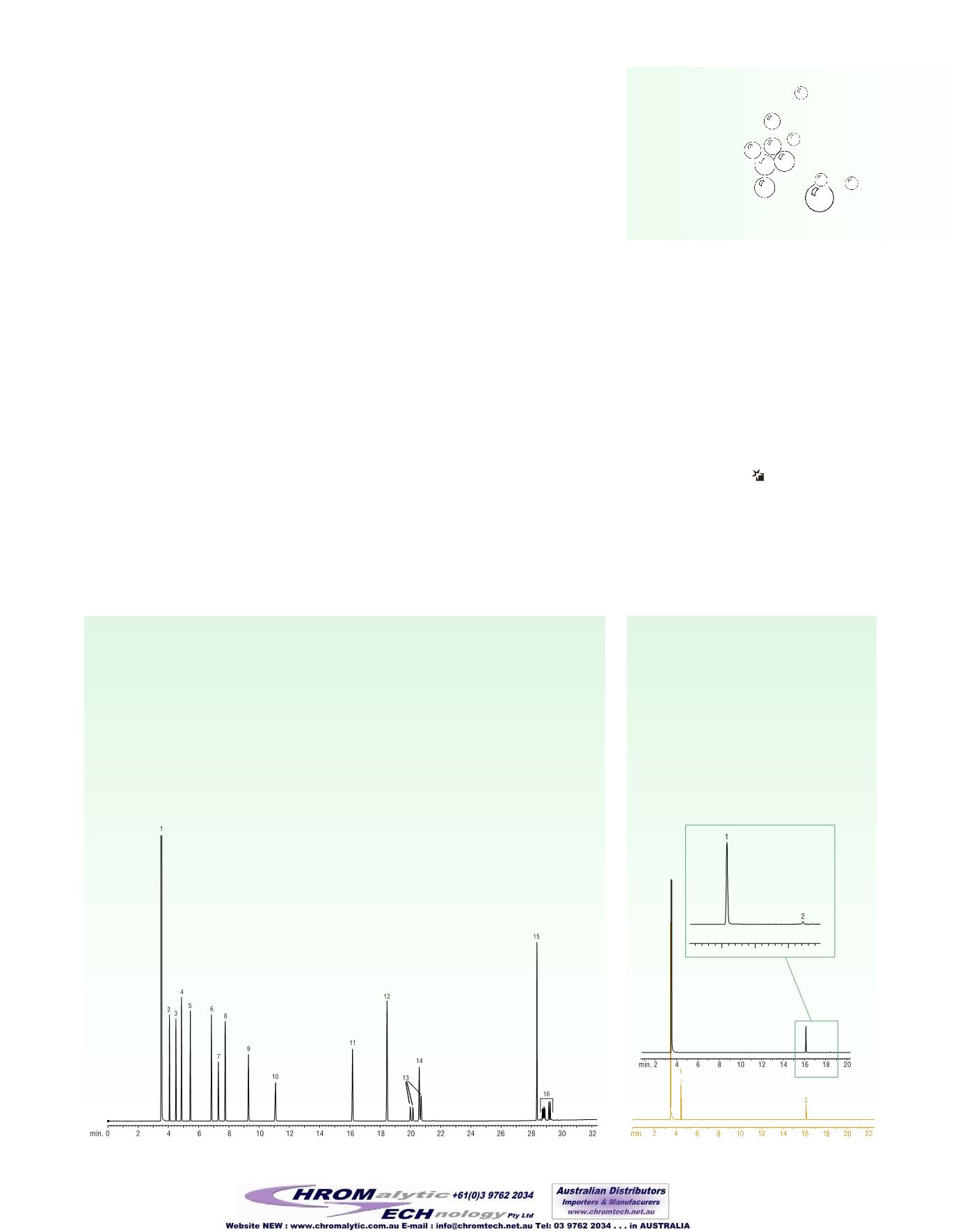

columns exhibit excellent selectivity for closely relat-
ed alcohols, such as ethanol, isopropanol,
tert
-
butanol, and
n
-butanol. An Rtx
®
-VMS column is
compatible with higher initial oven temperatures—
note the 60°C starting temperature in Figure 1—
allowing greater sample throughput due to faster
oven stabilization time. Analyses of typical consumer
cleaning products, an all-purpose cleaner and a
glass cleaner, are shown in Figure 2.
Summary
An Rtx
®
-VMS capillary column makes these analyses
faster, with highly reliable results, and is an excellent
choice for this application.
• 3 •
www.restekcorp.com2003
Volume 2
800-356-1688
Efficient Analysis of Water-Miscible
Solvents in Cleaning Products
Using an Rtx
®
-VMS Capillary GC Column
By Rebecca Wittrig, Ph.D., Senior Innovations Chemist
✔
Higher initial oven temperatures allow greater sample throughput.
✔
Excellent selectivity for resolving closely-related alcohols and other solvents.
✔
Consistent column-to-column performance for quality control analyses.
Consumers use a wide range of products to promote
personal hygiene, improve personal appearance, and
reduce levels of microorganisms in the home envi-
ronment. Their choices make the cleaning and per-
sonal care products industry a multi-billion dollar
industry.
1
The Soap and Detergent Association
(SDA)
2
groups soaps and detergents into four gener-
al categories: personal cleansing, laundry, dishwash-
ing, and household cleansing. As with all other con-
sumer products, there is a need to test both raw
materials and final products in each of these cate-
gories. Composition and quality control analyses for
many of these products can be performed by gas or
liquid chromatography. For example, volatile com-
ponents, such as alcohols, can be monitored by
using an Rtx
®
-VMS capillary GC column.
Various ingredients are needed in cleaning and per-
sonal care products, to solubilize soils, wet surfaces,
References
1. Branna, T.
The I&I Market. Happi,
Nov. 2000.
2. The Soap and Detergent Association. Website:
www.sdahq.orgComing soon!
New technical guide:
Analyzing Cleaning
and Personal Care
Products by Gas and
Liquid Chromatography
mask odors, provide color, or perform other func-
tions. Solvents are included in these products prima-
rily to dissolve organic soils. Aside from safety con-
siderations, the main criterion for a solvent used in
cleaning products is miscibility with water, as the
solvent must form a solution with other water-solu-
ble components. Solvents that meet the criteria for
use in consumer cleaning products include alcohols
and glycols. In addition to water miscibility, these
solvents clean without leaving residue, making them
especially useful in products designed for cleaning
environmental surfaces, such as glass cleaners.
Water-soluble solvents in cleaning products are ana-
lyzed by gas chromatography to ensure product
quality and to further new product development. A
60m x 0.25mm ID x 1.4µm film Rtx
®
-VMS capillary
GC column is an excellent choice for analyzing a
wide range of cleaning solvents (Figure 1). These
GC_FF00647
Figure 2
— Use an Rtx
®
-VMS column to
quantify a wide range of cleaning solvents.
Rtx
®
-VMS, 60m, 0.25mm ID, 1.4µm (cat.# 19916)
Sample:
Approx. 5% sample in methanol
Inj.:
1.0µL split (split ratio 100:1),
4mm inlet liner (cat.# 20814)
Inj. temp.:
250°C
Carrier gas:
hydrogen, constant flow
Flow rate:
1.5 mL/min.
Oven temp.:
60°C (1 min. hold) to 138°C @ 4°C/min., to
145°C @ 2°C/min., to 210°C @ 15°C/min.,
to 230°C @ 5°C/min.
Det.:
FID @ 250°C
Cleaning Solvents
Rtx
®
-VMS, 60m, 0.25mm ID, 1.4µm (cat.# 19916)
Sample:
1% each solvent in methanol
Inj.:
1.0µL split (split ratio 100:1), 4mm inlet liner
(cat.# 20814)
Inj. temp.:
250°C
Carrier gas:
hydrogen, constant flow
Flow rate:
1.5 mL/min.
Oven temp.:
60°C (1 min. hold) to 138°C @ 4°C/min.,
to 145°C @ 2°C/min., to 210°C @ 15°C/min.,
to 230°C @ 5°C/min.
Det.:
FID @ 250°C
1. methanol
2. ethanol
3.
iso
-propanol
4.
tert
-butanol
5.
n
-propanol
6.
iso
-butanol
7. methyl Cellosolve
®
8.
n
-butanol
9. Cellosolve
®
10. ethylene glycol
11. butyl Cellosolve
®
12. limonene
13. dipropylene glycol monomethyl ether (DPGMME)
14. diethylene glycol ethyl ether (DEGEE)
15. phenyl Cellosolve
®
16. tripropylene glycol monomethyl ether (TPGMME)
Glass Cleaner
GC_FF00645
Figure 1
— Commonly used cleaning solvents on an Rtx
®
-VMS column. Unique
selectivity allows a 60°C starting temperature, for fast sample throughput.
All-purpose cleaner
1. butyl Cellosolve
®
2. limonene
GC_FF00646
1.
iso
-propanol
2. butyl Cellosolve
®
Ordering Information
|
Rtx
®
-VMS Columns
Rtx
®
-VMS columns are listed on page 4.


















